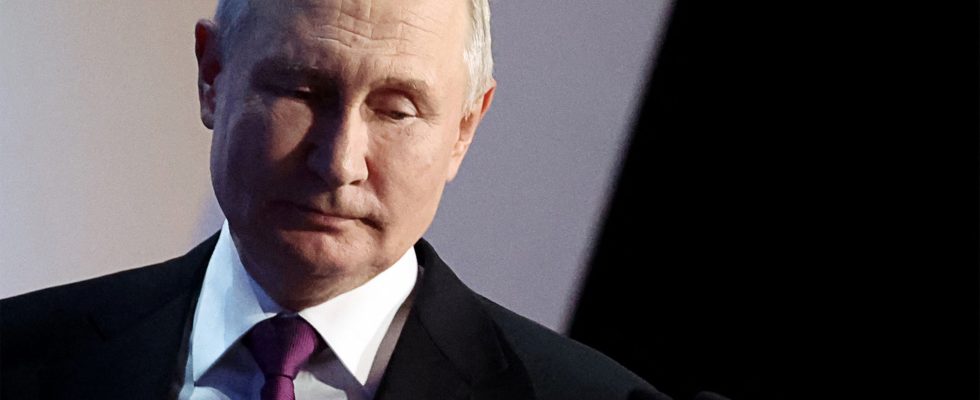On Russian Telegram channels, we would almost exult about it. “This disorder is beneficial for Russia, because the globalist toad will be distracted from Ukraine and will work to try to extinguish the eternal fire in the Middle East”, reacted, as early as October 7, the day of the attack of Hamas against Israel, Russian TV host Sergei Mardan.
Mired for more than a year and a half in a war in Ukraine from which he is struggling to find a solution, Vladimir Putin sees in the conflagration in the Middle East an unexpected opportunity to reinforce his anti-West discourse – whose chancelleries support Israel, like Ukraine -, and hopes to reap the rewards on the diplomatic level. “This crisis is holy bread for Putin,” summarizes Tatiana Kastouéva-Jean, director of the Russia/NIS Center at the French Institute of International Relations (Ifri). He uses it to criticize the ‘double standards’ of Westerners who, according to him, condemn the bombing of civilian populations in Ukraine but refrain from doing so in the Middle East.”
Rally the countries of the South
The way for the master of the Kremlin to cheaply put his own war crimes in Ukraine into perspective. “Putin is seeking to take advantage of this crisis to crystallize around Russia the voices of the countries of the Global South, adds Sarah Fainberg, defense and security expert at Tel Aviv University. These are the non-aligned countries , or neutrals, who do not wish to take sides in Ukraine and find the American position absolutely hypocritical.” The idea being to anchor this attitude even more firmly. A posture of “total cynicism”, slips a European diplomatic source.
After the blocking by the United States, on October 18, of a UN resolution calling for a “humanitarian pause” between Hamas and Israel, Russian diplomacy took great pleasure in denouncing a decision to ” monstrous consequences” reflecting “the failure of American policy” in the region. “Russia does not have the means to establish a new Middle Eastern order, but it can significantly weaken Western positions, or even oust them from the region,” says Jean-Sylvestre Mongrenier, research director at the institute. Thomas More. Even if it means scratching Israel in the process. “The right to self-defense does not mean having a license for massive and indiscriminate reprisals,” criticized the Russian Foreign Ministry on the same day, in a barely veiled criticism of the Jewish state.
Despite hitherto cordial relations between Putin and Netanyahu, the score played by Moscow in the region could, ultimately, mark a turning point in the relationship between the two leaders. In addition to having waited no less than nine days, after the attack of October 7, to present “his sincere condolences to the families and friends” of the victims, the head of the Kremlin has, for the moment, never qualified Hamas’s “terrorist” action. Thanks to the conflict in Gaza, the risk for Russia of seeing Israel militarily supporting Ukraine has also receded in the short term – where its support had for the moment been mainly limited to humanitarian aid.
Less ammunition for Ukraine?
On the military level, the opening of a broader front in the Middle East would constitute a serious challenge for the West. “There is a risk of dispersion of financial and military capabilities,” notes Tatiana Kastouéva-Jean of Ifri. “If the United States or Europe have to deliver weapons to Israel, it is very likely that there will be will have less for Ukraine.” In the medium term, the question of munitions – fundamental to supporting the Ukrainian war effort – appears to be the most uncertain.
“Even if it is a limited campaign and the IDF has significant stocks, there will come a time in the coming months when they will have to be replenished,” points out Yohann Michel, researcher on international defense issues. Institute for Strategic Studies. However, our production capacities are limited and already in high demand.” Beyond just the aid provided to Ukraine, the pressure is all the greater as many Western countries – like France – are simultaneously seeking to increase their own arsenals, neglected in recent years.
In Moscow, there is hope that the war between Hamas and Israel will help blunt aid to Ukraine. “Since the start of the conflict, Putin has been banking on the fact that Western public opinion will eventually tire and that this will result in a drop in military support for Kiev,” explains Marie Dumoulin, former diplomat and director of the Wider Europe program at the European Council for Foreign Relations. Until now, Putin seemed to be waiting for the 2024 US presidential election and a possible victory for the Republicans, many of whom question aid to Ukraine. But the conflict in the Middle East constitutes an anticipated boon for him.
